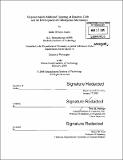Oligosaccharide-mediated targeting of dendritic cells and the development of carbohydrate microarrays
Author(s)
Adams, Eddie William, 1972-
DownloadFull printable version (8.381Mb)
Other Contributors
Massachusetts Institute of Technology. Department of Chemistry.
Advisor
Peter H. Seeberger.
Terms of use
Metadata
Show full item recordAbstract
Bone-marrowed derived dendritic cells (DCs) constitute a critical arm of the immune system capable of polarizing the immune response toward active immunity or tolerance. Successful therapeutic modulation of DC function in vivo should create opportunities for more potent, efficacious vaccines and, in setting of autoimmunity, strategies aimed at the limiting the numbers and character of autoreactive T cells. This thesis describes work aimed at accessing DCs in vivo by way of cell-surface carbohydrate binding proteins expressed by these cells. Synthetic oligosaccharides bearing a tri(ethylene glycol) linker with a reactive thiol handle were chemically coupled to model antigens to generate oligosaccharide-antigen conjugates. These conjugates were evaluated for their ability to specifically target DCs in vitro. Those oligosaccharide moieties that led to enhanced presentation of model antigen to antigen-specific T cells were evaluated for their ability to access DCs in vivo upon subcutaneous immunization and the immunological outcome of DC targeting was studied in detail. The development of carbohydrate microarrays as tools for the identification of the carbohydrate specificities of carbohydrate-binding proteins (lectins and antibodies) is also described here. High density carbohydrate arrays were generated with synthetic saccharides bearing the aforementioned thiol linker. (cont.) These arrays were used to study the glycan-dependent interactions of two gpl20-binding proteins of immunological consequence, the dendritic cell lectin DC-SIGN and the broadly neutralizing antibody, 2G12, as well as two inhibitors of HIV infection isolated from cyanobacteria, cyanovirin-N and scytovirin. The structural diversity of immobilized carbohydrates represented on these arrays enabled the unambiguous characterization of the structural determinants required for gpl20 recognition by each of these proteins.
Description
Thesis (Ph. D.)--Massachusetts Institute of Technology, Dept. of Chemistry, 2005. Vita. Includes bibliographical references.
Date issued
2005Department
Massachusetts Institute of Technology. Department of ChemistryPublisher
Massachusetts Institute of Technology
Keywords
Chemistry.